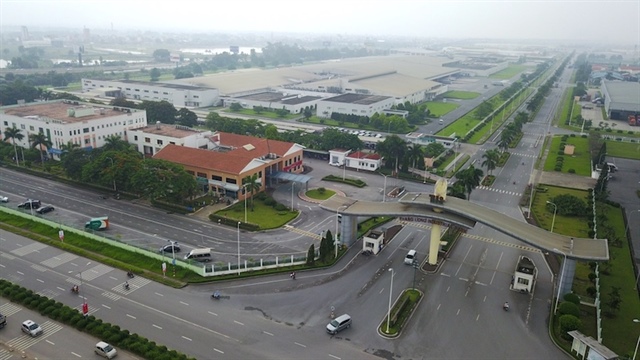|
Vietnam real estate market in 2024 shows signs of recovery
In 2024, the housing market shows more positive signs than in 2023, but there will be differences in the timing of the recovery across segments.
Nearly 50% of respondents in Vietnam's real estate industry believe the market will recover in the second half of 2024, according to Vietnam Report's latest survey.

The development of industrial real estate represents a very favorable direction for the real estate market. Photo: Pham Hung/ The Hanoi Times
|
Vietnam Report CEO Vu Dang Vinh said companies expect three factors to boost their performance in 2024: gradual economic recovery, lower interest rates, and successful application of digital transformation in management and operations.
Real estate experts and businesses agree that the real estate market will show more positive signs in 2024 than in 2023, but there will be differentiation among different segments, according to the survey.
The report highlighted that the office leasing and industrial real estate segments are benefiting from favorable factors such as geographical location, public investment in infrastructure, strong FDI inflows due to the impact of newly signed free trade agreements, the "China+1" strategy, stable economic-political environment, and competitive advantage due to low industrial land prices compared to other countries in the region.
These factors are the driving force behind the development and investment attractiveness of the office leasing and industrial real estate segments. Some 34.5% of companies predict that the industrial real estate segment will thrive in the first half of 2024.
Regarding the office leasing market, about 35.7% of respondents forecast a recovery in the second half of 2024.
Residential real estate, high-end apartments and resorts will experience a slower recovery than other segments due to oversupply after a period of rapid growth and people's caution in investing in these segments, according to the report.
The focus in these segments is on the vision of building one million social housing units between 2021 and 2030, along with planning for land reserves, incentives for investors, and adjustments to sales policies. This will be an opportunity to increase the supply of housing and provide access to social housing for people on low incomes, the report stresses.
The Vietnam Report also examines the state of the real estate market in 2023, a challenging year for the industry as global and Vietnamese economic growth slowed, affecting people's incomes and reducing the number of successful real estate transactions.
By the end of 2023, the number of dissolved real estate companies reached 1,286, an increase of 7.7% from 2022, according to data from the General Statistics Office.
There were 3,705 real estate companies that temporarily suspended operations, an increase of 47.4% compared to 2022.
In 2023, 41.2% and 16.1% of the businesses experienced revenue and profit declines of less than 25%, respectively. In addition, most of these companies will trim their payroll by 42.9% in 2023.
Many of the real estate companies surveyed said the three most important drivers of their business results were the company's reputation and brand in the market, a skilled and experienced workforce with high discipline, and efficient cost reduction and utilization measures, Vinh said.
As a result, he said, leveraging their existing position and reputation, along with cost-cutting measures, has helped real estate companies maintain operations, with hopes for a more vibrant market in the current year.
Hanoi Times
|